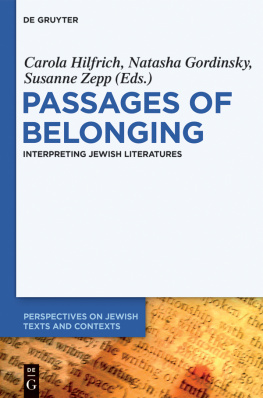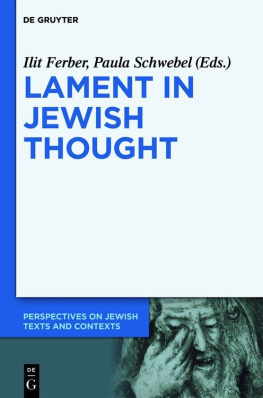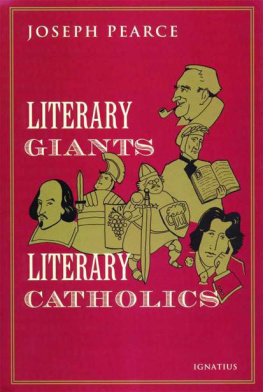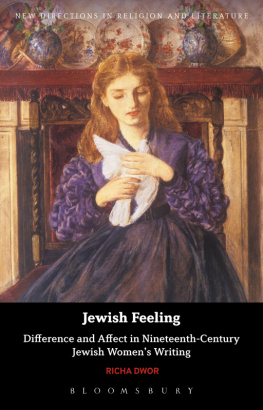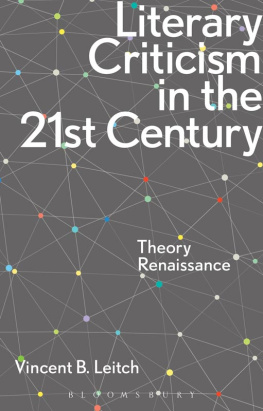Contents
Guide

Passages of Belonging
Perspectives on Jewish Texts and Contexts

Edited by
Vivian Liska
Editorial Board
Robert Alter, Steven E. Aschheim, Richard I. Cohen, Mark H. Gelber, Moshe Halbertal, Christine Hayes, Moshe Idel, Samuel Moyn, Ada Rapoport-Albert, Alvin Rosenfeld, David Ruderman, Bernd Witte
Volume 7
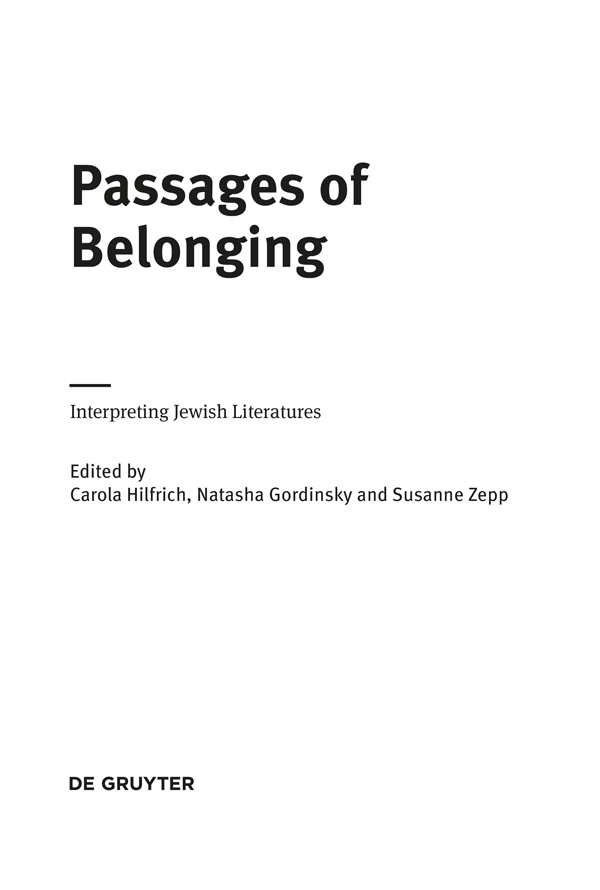
Supported by the I-CORE Program of the Planning and Budgeting Committee and The Israel Science Foundation (grant No. 1798/12)

ISBN 978-3-11-043861-1
e-ISBN (PDF) 978-3-11-052551-9
e-ISBN (EPUB) 978-3-11-052349-2
ISSN 2199-6962
Library of Congress Control Number: 2018965712
Bibliographic information published by the Deutsche Nationalbibliothek
The Deutsche Nationalbibliothek lists this publication in the Deutsche Nationalbibliografie; detailed bibliographic data are available on the Internet at http://dnb.dnb.de.
2019 Walter de Gruyter GmbH, Berlin/Boston
Cover image: Svetlana Boym
www.degruyter.com
Carola Hilfrich, Natasha Gordinsky, Susanne Zepp
Introduction
This volume collects contributions from members of the research group Fields of Belonging: Interpreting Jewish literatures, founded in 2010 at the Simon Dubnow Institute for Jewish History and Culture at the University of Leipzig. We were keen to initiate an encounter between writers and scholars in order to think about questions of belonging in Jewish literatures beyond the confines of identitary essentialism be it an essentialism of belonging, Jewishness, or literariness. Building on existing endeavors in the general Humanities (, Pinsker 2010).
However, while these studies engage mainly with the classical canon of Jewish literatures in Hebrew, Yiddish, English, and German, we sought to encompass these together with the outer and more contemporary reaches of the modern Jewish canon, including texts from North Africa, Brazil, Russia, Argentina, and France. In this context, passages appear less as intermediary stages between departure and return and more as situations that suspend any teleological orientation. In this sense, we take passages not only to include movement in space (such as from one place to another) and elapsing in time (as represented in and by literature), but also to encompass a theoretical tool for literary interpretation. Such passages are no longer metaphors or merely representations; rather, they are highly concrete situations, experiences, and forces, as in Bakhtins seminal definition of the chronotope: In the literary artistic chronotope, spatial and temporal indicators are fused into one carefully thought-out, concrete whole. Time, as it were, thickens, takes on flesh, becomes artistically visible; likewise, space becomes charged and responsive to the movements of time, plot and history. This intersection of axes and fusion of indicators characterizes the artistic chronotope (, 84).
Over the years, our joint discussions produced a ripple effect in the respective works of all participants, as well as among them. The collaboration of writers and literary scholars made us aware that, while scholarly theorizations of passages of belonging must be rigorous, the literary work challenges us to remain ). For us, this condition was made concrete by thinking it in the multiple passages linguistic, geographic, generic, cultural, historical of Jewish and literary belonging.
The volume opens with a literary section that presents works in different genres by four contemporary writers and translations and critical commentaries of these works. Taken together, these contributions suggest that we think of belonging in terms of dispossession and movement, the vulnerabilities of owing and owning, and the charged spatiality of enactments of such vulnerabilities.
Hlne Cixouss Ail! Il ne faut pas le dire / Oy! You Mustnt Say That sets the stage for such literary thinking. It is a play for two characters, the octogenarian sisters Selma and Jenny Meyer, cast in a Godotian scene on their return from Osnabrck, their native city in Germany, and preparing a Leberhckele in the kitchen, Paris. Bickering over the basics of their umlauted Jewish family dish, they are negotiating their place in an economy of the unsayable and the position in language on which it depends. Their kitchen talk unfurls onto the soundscape of a revenant and repudiated, native language, namely, allemand , or German in French. In this soundscape, the scene of belonging plays out in an unheard-of, ail iterated mode, as Carola Hilfrich suggests in her commentary. She shows how the plays acoustic territory forms a sonic discourse on belonging that is equally feverish, energetic, and participatory, focusing interpretation on the aural lexicon and range of the soundscape.
In her poem Vous trouverez ce livre / You Will Find This Book, Ccile Wajsbrot reminds us of the difficulty of escaping class, violence, and other adversities as either obstacles to or markers of belonging. The book she writes about is an embodiment of the exigencies of the sense of place as it connects with family histories and histories of dispossession. At the same time, her poem provides social commentary and, in fact, establishes the conditions for a negotiation of both belonging and class. Thus, it serves as a reminder that the politics of poetry resides in its centrality to the construction of a political person. Stephanie Bung unravels these intricacies from a philological perspective while emphasizing the sense of belonging as ownership. In focusing on the poems expressive voice as an embodiment of radically different experiences of owing and owning, her commentary draws attention to the potential of poetic language to rethink dominant paradigms of belonging.
The first of Alex Epsteins micro-stories, originally published in Hebrew and entitled Shortcuts Home, consists of four sentences, each of which imagines and performs another conundrum of belonging and homeliness, while the second deals with the economy of family and cultural possessions through a little tale of immigration. Natasha Gordinsky explores how these micro-stories resist the trope of homecoming and undermine a totalizing narrative of immigration as a single and linear story. She argues that Epsteins texts epitomize, in their fragmented form, a (post-)Soviet Jewish mode of belonging, constituted by a persistent negotiation between fiction and history.
Almog Behars Ana Min Al Yahoud stages the scene of identification that regulates belonging through language and nation. Shifting between Arabic and Hebrew, his story challenges the pervasively monolingual understanding of Israeli literature, and advances a view of literary belonging as both multiple and conflicted. Yael Kenans commentary on the story focuses on the bodily and mnemonic aspects of the Arabic tongue that dwells so prominently in the protagonists Hebrew in/of the story. She suggests that we understand the title utterance, and its reverberations in the text, as an ethical shibboleth or a linguistic site for negotiating conflicting cultural identities. Her reading significantly complicates Deleuze and Guattaris notion of minor literatures by demonstrating how Behars hybrid language serves as a poetic and political tool for bringing together the collective and individual.

